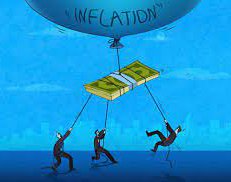Inflation reached 8.1 percent in the eurozone in May, according to Eurostat's preliminary reading. ECB estimates wage growth to clock in at 3% this year, then declining to 2.5% the next. "There's galloping inflation and wages aren't keeping pace," said Luca Visentini, secretary-general of the European Trade Union Confederation. [Inflation eats wages, leaving workers hungry – Politico]
SCHAERBEEK, Belgium — Cédric Droyers coordinates food donations at the Saint Vincent de Paul association in Schaerbeek, one of Brussels’ poorest and most populous neighbourhoods.
On a recent morning there, there were piles of strawberries and fresh produce, rice and pasta packets, canned food and preserved milk, ready meals and baby food. Volunteers danced through it all, hastily dropping items into large boxes to be distributed to a long queue of people waiting in line outside.
Recently, Droyers' food bank has been squeezed at both ends: The queues have been getting longer and the products fewer, as donors cut back support. He registered a 20 percent increase in boxes distributed in April compared with January. "We have to estimate how many parcels we have to make, to know if we have to put a lot in, or if we have to ration to be able to give to everyone," he said.
The cause for both sources of pressure is inflation, which is increasing demand for food banks’ services just as donations go down. "Prices are also rising for food, for raw materials, for energy, etcetera. This also has an effect on the supply we receive," said Etienne Rubens, who coordinates a network of food banks in Belgium. Demand has increased by up to a quarter in some of the network's branches, as single mothers and workers join the queues, Rubens said.
"They have a salary, but they need to pay rent, bills, and at the end of the month, they aren’t able to manage," said Droyers.
Inflation reached 8.1 percent in the eurozone in May, according to Eurostat's preliminary reading, a record that also came in above expectations. While wages have been picking up — growing by 2.8 percent in the eurozone in the first quarter year-on-year, according to the ECB — that's well below the rate needed to keep up and cover essentials like electricity and grocery bills.
“On the one hand, the glass is half full, meaning that there is no dreaded spiral in prices and wages,” said Andrea Garnero, an economist with the Organization for Economic Cooperation and Development. “But the flip side of the coin is that wages lose significant purchasing power.”
What Garnero referred to was the driving fear among policymakers about the infamous wage-price spiral — when broad wage boosts push up prices further and erode any increase in purchasing power, effectively entrenching inflation.
Avoiding wage-price spirals is "an important element for inflation not to become entrenched," said European Commission Vice President Valdis Dombrovskis last week. "Correspondingly, there’s also a substantial responsibility of social partners to find the right balance."
Getting hotter
Currently, the ECB estimates wage growth to clock in at 3 percent this year, then declining to 2.5 percent the next. But these projections are based just on wage agreements closed in the first quarter of the year.
The consensus view is that wage increases in the order of 3 percent are acceptable, the OECD's Garnero argues, as they would cover the ECB’s inflation target of 2 percent plus 1 percent of annual average productivity increase.
Above that rate, "there's reason to worry," he said. "We are far from these figures to date, [but] we could get closer with the new [contract] renewals and if inflation persists."
To keep inflation in check, the ECB has essentially pre-announced rate hikes for July and September and is winding down its bond-buying program. On the fiscal side, meanwhile, governments in Europe have been trying to offset inflation's hit to pocketbooks by cutting taxes and distributing handouts. The various national measures adopted since last fall to cushion high energy prices account for 0.6 percent of the bloc’s GDP this year, the EU estimates.
Germany, France, Italy and Spain, for example, have all lowered fuel taxes to give drivers some respite at the pump. Germany is also trialing a nationwide €9 monthly public transport ticket throughout the summer.
France, the country which has so far spent the most on containing inflation's impacts on households, froze gas prices in place; capped the rise of energy prices to 4 percent; and gave a €100 "energy check" per year to the poorest households — a handout copied by Italy, which is distributing €200 payments to over 30 million pensioners and workers struggling to make ends meet.
The catch is that increasing such handouts risks fuelling consumer demand and inflating prices. That’s why Brussels has been calling on governments to rein in support measures and target only those who need help most.
"We should keep in mind that there is a loss of purchasing power. We should try to cushion this, especially for more vulnerable workers and households," said European Economy Commissioner Paolo Gentiloni last week. "And we shouldn't forget the fact that [inflation] is probably not there to last forever."
The European Commission, for its part, has predicted that the rise in prices will peak this quarter and gradually come down, and it has recommended keeping a lid on wage growth. But inflation forecasts have been wrong before, and unions are eager for a level-up.
"There's galloping inflation and wages aren't keeping pace," said Luca Visentini, secretary-general of the European Trade Union Confederation, an umbrella body representing workers’ interests.
Germany's powerful union IG Metall, for example, has demanded an 8.2 percent pay rise for steel workers, and is preparing to strike if its demands aren't met. Belgium's main trade unions declared a general strike on Tuesday, demanding higher salaries and pensions to counter the record rise in prices, which scraped 9 percent in May.
In addition, there are other factors adding pressure on wages. With unemployment at a record low in the bloc — EU unemployment has dropped to 6.2 percent — workers will leverage their bargaining power to demand higher wages, and employers need to raise salary offers to attract workers. Countries have also bumped up or are planning to bump up the minimum wage rate, which in some EU countries covers a significant numbers of workers.
For their part, business groups are pushing back. "It's important that social partners act responsibly, because otherwise you will destroy the future potential of sustaining this wage growth," said Markus Beyrer, director general of the industry body BusinessEurope.
“Employers are being asked to adjust wages at least to inflation," Visentini said. "These negotiations won’t be easy."



